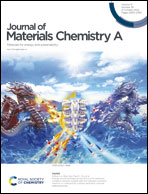A polyamino acid with zincophilic chains enabling high-performance Zn anodes†
Abstract
Aqueous zinc metal batteries (AZMBs) have been regarded as potential alternatives to lithium-ion batteries by virtue of their high energy, low cost, and high safety. However, the practical application of AZMBs is limited because of several issues of Zn anodes, including corrosion, hydrogen evolution, and dendrite formation. In this work, a polyamino acid (PAA) is introduced as a multifunctional electrolyte additive for the modification of Zn anodes. DFT calculations reveal that PAA has a unique long-chain structure with abundant N,O-containing functional groups, showing a good affinity for Zn atoms/ions through preferential absorption. Therefore, PAA can firmly adsorb on the surface of a Zn anode to establish a protective layer with good hydrophilicity. In situ optical measurement and gas chromatography analysis show that the PAA additive significantly adjusts the uniformity of Zn plating/stripping and efficiently suppresses hydrogen evolution and corrosion reactions. In PAA-modified ZnSO4 electrolyte, the Zn anode exhibits stable cycling over 2200 h and a high reversibility (with an average coulomb efficiency of over 99.8%). The fast deposition/stripping process can be stably performed even at an ultrahigh current density of 40 mA cm−2. A Zn–MnO2 full cell shows a good cycling performance without capacity decay even after 1300 cycles, demonstrating a superior modification effect of the PAA as the electrolyte additive.



 Please wait while we load your content...
Please wait while we load your content...